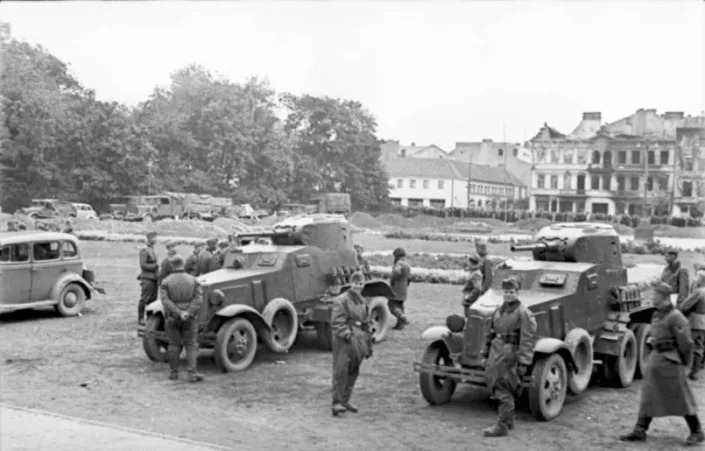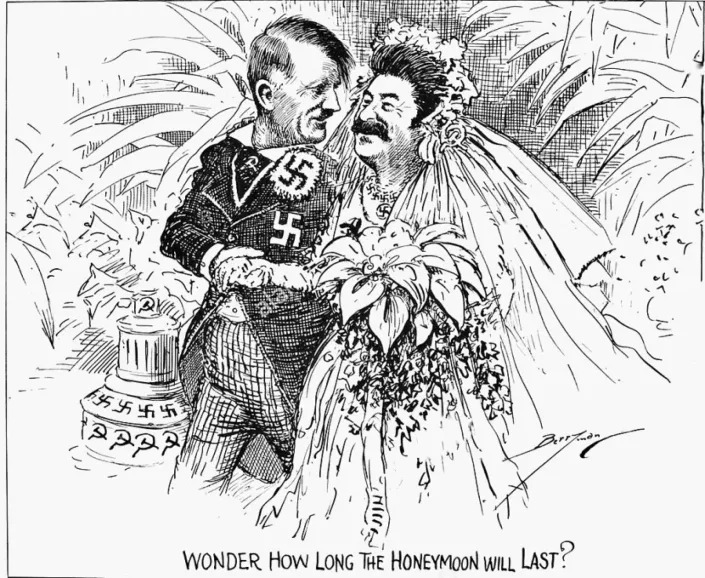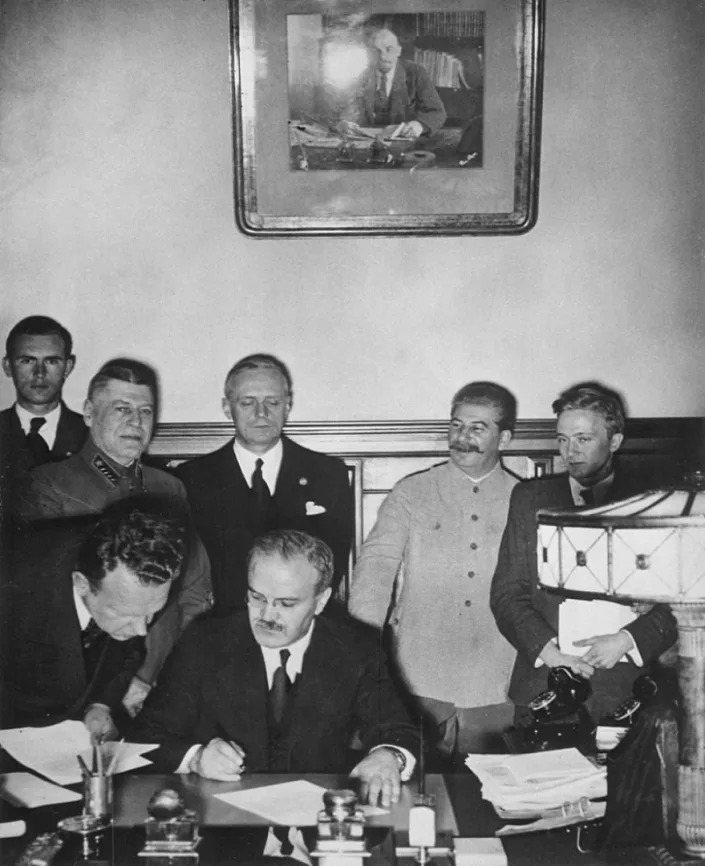https://fb.watch/fkZ0K6_zEk/
Today Russian propaganda is going the extra mile to amplify myths about the Second World War, trying to present the war with Ukraine as a course for "denazification" of the country.
A few weeks ago, on April 13, the Russian Federation Council, following the State Duma, even approved a bill that imposes fines on those who dare to equate the goals, decisions, and actions of two totalitarian regimes — the Soviet leadership and Nazi Germany and its allies during World War II (as well as the actions of the command and military of these countries).
Specifically, the law forbids the denial "the decisive role of the Soviet people in the defeat of Nazi Germany, as well as the humanitarian mission of the USSR in the liberation of European countries."

Such narratives legislate some of the most popular myths of Russian propaganda about World War II, which Russia has been actively spreading for many years.
"Almost ten years ago, Putin called on Russian
historians to develop a new history curriculum bereft of ‘internal
contradictions and ambiguities’," wrote Doug Klain, an Atlantic Council
expert, in April 2022, commenting on Vladimir Putin’s endeavors to
create a new ideology for the younger generation of Russians against the
background of the war with Ukraine.
"The revisionist version
of history that eventually emerged included attempts to rehabilitate
Joseph Stalin's personal reputation and promote the positive aspects of
the Soviet era, emphasizing the Soviet Union's role in the victory over
Nazi Germany,"
NV debunks the five most famous myths of Russian propaganda about World War II.
1 The German-Soviet war should be called the "Great Patriotic War"
However, the term Great Patriotic War is merely an ideological cliché, which in Soviet and later in Russian history had several purposes:
To emphasize the war of the entire Soviet people against Hitler’s Nazi troops. "In fact, such a single impulse is exaggerated," Ukraine’s Institute of National Remembrance explains.
"For many Soviet republics, including Ukraine, it was not always a war for their homeland. In Ukraine, the events of World War II were preceded by a decade of repression, the Holodomor, the Great Terror, during which the Stalinist regime killed millions of people. Many saw the beginning of the war as an opportunity for liberation from Stalinism. The capture of 5.75 million Red Army soldiers and officers also showed that hundreds of thousands of Soviet citizens were not ready to fight for Stalin and did not perceive the war as a patriotic one."To overshadow the facts of cooperation between the USSR and Hitler's Germany. These countries had been allies since 1939, and at the time, Soviet propaganda constantly emphasized their "friendship." The Molotov-Ribbentrop Pact, signed on August 23, 1939, guaranteed mutual neutrality between the USSR and Germany, but its secret protocol described how the Soviet Union and the Third Reich agreed to divide number of European countries into spheres of influence. When the Red Army crossed the eastern border of Poland on September 17, 1939, it was effectively the Soviet Union's entry into World War II on the side of Nazi Germany.
"Therefore, the concept of 'patriotic' was needed to cover up the facts of previous cooperation between the two totalitarian regimes," the UINR says.To take singular credit for the victory in World War II. Branding it the Great Patriotic War, the Soviet Union wanted to be the only winner in the war with the Nazis. Later, this "desire" was inherited by Russia, say, historians of the UINR, recalling that the very name "Patriotic" of the USSR was borrowed from tsarist Russia (the so-called victorious war of 1812 over Napoleon's troops). Modern Russia also uses the myth of the Great Patriotic War in order to maintain its influence on post-Soviet countries.
2 The USSR "liberated" the countries of Europe
This myth of the USSR, which allegedly "liberated the enslaved peoples of Europe", was in fact cultivated to justify the post-war Soviet presence across many European countries. Since the Red Army crossed the western borders of the Soviet Union in 1944, the expulsion of the Nazis from other countries on the continent did not bring them genuine freedom; instead, the "liberators" themselves became occupiers.
Thus, after the Baltic offensive in 1944, the Soviet Union occupied Estonia, Latvia, and Lithuania for the second time (these countries were first annexed in 1940 when they were forcibly turned into Soviet republics by the USSR). In addition, puppet communist governments were formed in Poland, Bulgaria, Romania, Czechoslovakia, and Hungary, which allowed the Soviet Union to create a Kremlin-controlled Eastern Bloc after World War II and consolidate its influence in the region for decades.

In addition, in recent years, the authorities of many countries of the former Eastern Bloc and ex-republics of the USSR have had to refute the mythologized claims of modern Russia.
"We object to the
historically unreliable statements of the Russian Foreign Ministry that
Estonia was ‘liberated’ by Soviet troops," the Estonian Foreign Ministry
said on September 23, 2019.
"The Republic of Estonia did not
take part in World War II and was occupied by both Nazi Germany and
Soviet Russia. The so-called ‘liberation’ was an occupation that lasted
for about 50 years,"
3 Russia as the successor to the USSR has a monopoly on the "great victory" over Nazism
The then-Ambassador of Ukraine to the United States, Volodymyr Yelchenko, tried to convey the danger of this myth, which Russia has long adopted and actively uses in its political propaganda, back in 2020 in his column for the Atlantic Council.
"Russia’s attempts to monopolize
the Soviet WWII experience also measn minimizing the contributions of
the Western allies," Yelchenko wrote.
"While the nations of
Central and Eastern Europe undoubtedly did carry the highest burden of
the war in Europe, the defeat of Hitler was only possible due to the
valor and historic sacrifices of all allied countries. This is
particularly true in relation to the United States of America and Great
Britain."
In fact, Russia was just one of many Soviet republics that paid a high price for the defeat of Nazi Germany. It should be remembered that only a small part of modern Russia was occupied by German troops during World War II, while Ukraine and other frontline republics of the USSR survived years of occupation, and had been at the epicenter of the conflict since 1939.
It was Ukraine that played host to the fiercest fighting, as the war swept through its entire territory twice: during the offensive and then during the retreat of German forces, including Army Group South.
According to the most modest estimates, between 8 and 10 million Ukrainians died (total military and civilian casualties). In relative terms, Ukraine and Belarus lost proportionally more of their pre-war population than Soviet Russia.
At the same time, Ukraine's contribution to victory was relatively important. More than 7,000,000 Ukrainians were fighting for victory within the Red Army, and tens of thousands more in other allied forces, including:
in Poland - 120,000 Ukrainians
in the United States - 80,000
in the armies of Great Britain and Canada - 45,000
in France - 6,000
as part of the liberation movement in Ukraine itself (Ukrainian Insurgent Army) - 100,000
"No
country can claim recognition of its unique role in the victory over
Nazism," says Dmytro Hainetdinov, a Ukrainian historian and head of the
scientific and educational department of the National Museum of the
History of Ukraine in World War II, in 2021.
"Victory is the result of titanic efforts of dozens of states and hundreds of nations."
At the same time, according to him, the war became the most terrible catastrophe for Ukraine, "because some of the fiercest battles of the whole war took place on our territory, Ukraine suffered dreadful human losses and damage to cities and villages, industry, agriculture, and in terms of its brutality, the German occupation of Ukraine cannot be compared to the occupation of France or other Western European countries."
"So, what Russian propaganda has been trying to portray as 'Russian glory' for many years was largely a 'Ukrainian war.' At present, under the guise of ‘victorious’ authority and aggression against other states, the Russian government is behaving like a destroyer of the system of international relations established by the victorious states of World War II. And in this context, Russia's behavior in the international arena is more reminiscent of Hitler's Germany in the 1930s, shortly before the global conflict," Hainetdinov predicted quite correctly a year ago.
4 Stalin and Hitler were not allies, the Molotov-Ribbentrop Pact was "forced" and provided time to "prepare for war"
The Russian Foreign Ministry and Russian MPs regularly insist on such arguments, stressing that the Molotov-Ribbentrop Pact was a "forced diplomatic step for the USSR", which allegedly started the war on strategically more favorable borders for the USSR, and the population of these territories suffered Nazi terror two years later, sparing "hundreds of thousands of lives."
However, this interpretation completely distorts reality, and the fact that between the signing of the Non-Aggression Pact in August 1939 and the German attack on the USSR in June 1941, the two countries actually acted as close allies, Maksym Mayorov, from the Ukrainian Institute of National Remembrance, explains. This history is recalled in a special project about the myths concerning the beginning of the WWII (a joint project of the Ukrainian Institute of National Remembrance, the Center to Study the Liberation Movement of Ukraine, and the KSD Publishing House).
A secret protocol to the Molotov-Ribbentrop Pact provided for the division of spheres of influence between the USSR and Nazi Germany in Eastern Europe in the event of "territorial and political reorganization." Berlin claimed Lithuania and the western part of Poland, while Moscow encroached on Latvia, Estonia, Finland, the eastern part of Poland, and Bessarabia, which was part of Romania.
Therefore, from the first days of World War II — the attack on Poland on September 1, 1939 — the Soviet Union supported Hitler's Germany. On this day, the Soviet Union provided Germany with a radio station in Minsk, which acted as a beacon to guide Luftwaffe bombers to Polish cities.

On September 17, Stalin informed the German ambassador that the Red Army was beginning to occupy Poland. On the same day, Soviet troops occupied Ternopil and Rivne, the next — Kolomyia, Stanislaviv (now - Ivano-Frankivsk) and Lutsk. Thus, the Red Army deprived Poland of the last chance to repel Germany, as western Ukraine and Belarus were the rear bastions of Polish defense.
The German-Soviet communiqué of September 18, 1939, is devoid of any ambiguity.
It stated that the actions of Soviet and German troops in Poland "did
not have any purpose that would run counter to the interests of Germany
and the Soviet Union or would be contrary to the spirit and letter of
the non-aggression pact."
The next communiqué on September 22
already established a demarcation line between the two states. And on
September 28, 1939, the USSR and Germany signed the Treaty of Friendship
and Borders. Thus, both aggressors publicly stated that there were no
contradictions between them in their attitude towards Poland.
The maneuvers of German and Soviet troops in Poland were coordinated. After receiving a message about the crossing of the border by the Red Army, the German command ordered the troops to stop on the line Skole—Lviv—Volodymyr-Volynskyi—Brest—Bialystok. On September 20, Hitler ordered troops to cease hostilities with the Poles and retreat westward beyond the August 1939 demarcation line. The Wehrmacht withdrew and handed over the conquered territories to the Red Army. At the end of September, the parties agreed to change the demarcation line. Now Soviet troops were taking it east. These were quite sophisticated maneuvers. For example, the siege of Lviv and Brest was started by the Germans, who later retreated, and eventually was completed by the Red Army.
The USSR and Nazi Germany even held joint parades. On September 22, 1939, units of the Wehrmacht Motorized Corps under General Heinz Guderian and a separate Red Army tank brigade led by Soviet Brigadier General Semyon Kryvoshein took part in such a ceremony during the handover of Brest.
There were also cases of interaction between German and Soviet troops in battles against the Polish Army. For example, on September 24, 1939, Soviet and German troops launched a joint operation to encircle Polish units near Zamość. On September 26-28, near Zhuravyntsi, the allies defeated several regiments of Polish cavalry retreating to Hungary. On September 27, Soviet Marshal Semyon Timoshenko reported on the defeat of a Polish group together with the Germans in the Nemyriv area.
5 Georgy Zhukov — "Marshal of Victory"
This myth is so popular in modern Russia that the Ukrainian Institute of National Remembrance has even released a separate video to desecrate the image of the Soviet military leader and remind everyone of the true cost of his victories.
Georgy Zhukov, whose cult of personality is cherished in modern Russia, was chief of the USSR General Staff at the beginning of the Soviet-German war, so he was tasked with organizing the defense and repelling Hitler's army.
"In 1942, Zhukov commanded the Western Front," recalls historian Rostyslav Pylyavtsev, the author of the UINR documentary.
"This ‘Marshal of Victory’ conducted continuous offensives, which ended
in defeat. The total loss in just the Rzhev-Vyazma offensive operation
alone amounted to 777,000 people. These unheard-of casualties did not
stop Zhukov, so the nicknames of the commander, Catafalque or Butcher,
quickly gained steam among the rank-and-file fighters,”
The
culmination of the "glory of the marshal" was the attack on Berlin. And
although the defeat of Germany at that moment was simply a matter of
time, Zhukov did not pay heed to the avoidable casualties.
"In
Operation Berlin, he lost more than 15,000 troops, almost 90 tanks, and
40 planes every day, all in order to enter Berlin earlier than the
Allies," the UINR short film states.
"According to the
official, clearly understated data, the Red Army lost 352,000 people,
who were killed and wounded in the Berlin operation alone."
It is also known that the decision to entrust the capture of Berlin to Zhukov was a political one. In November 1944, he was appointed commander of the 1st Belarusian Front, which had previously been successfully commanded by Konstantin Rokossovsky, a Soviet general of Polish descent known for his tactical talent, respect, and humane treatment of his subordinates. It was his troops that could take Berlin, but Stalin decided otherwise.
"I am the most unfortunate marshal of the Soviet Union," Rokossovsky later recalled ironically.
“In
Russia, I was considered a Pole, and in Poland — a Russian. I had to
take Berlin, I was the closest. But Stalin called and said: 'Zhukov will
take Berlin.' I asked, 'Comrade Stalin, why such disfavor?' Stalin
replied: 'This is not a disfavor, this is politics.' And hung up."
After the war, Zhukov was commandant of the Soviet occupation zone in Germany but was soon removed from office for war crimes and looting.
Marshal Zhukov was involved in other crimes — in 1954 he led 45,000-strong military exercises at the Totsk test site, where an atomic bomb was detonated to study the capabilities of the army in a nuclear war. Due to secrecy, no one still knows how many soldiers died or were injured as a result of this inhuman experiment.
In 1957, "for his mistakes",
Georgy Zhukov was removed from the post of minister of defense of the
USSR. When these "mistakes" were forgotten, the system turned the
marshal "into a bright star, a totalitarian propaganda tool."
"We
owe the victory over Nazism to millions of soldiers and officers,
hundreds of thousands of whom lie in nameless graves. In such
circumstances, there can be no ‘Marshal of Victory’ and it is probably
unethical to associate the victory with any particular name," recall
UINR historians.





No comments:
Post a Comment
Note: Only a member of this blog may post a comment.